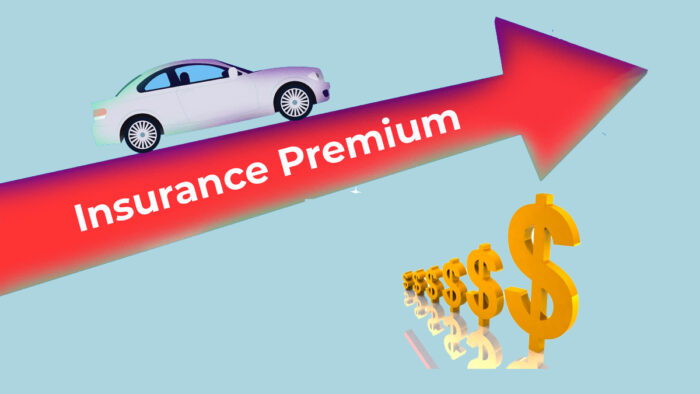Are you on the lookout for answers as to why your car insurance rate is increasing? If yes, then you are in the right space. If there has been an increase in your rate recently, you must have wondered why your car insurance keeps increasing.

An increase in the price of auto insurance can be upsetting and confusing for drivers. Your car insurance rate can increase due to several factors, ranging from changes in general market trends and individual situations.
For policyholders looking to manage the cost of their insurance, having an understanding of factors that affect car insurance is crucial. This article will examine some of the major causes of increase in auto insurance rates and tips on how to reduce it.
Why is My Car Insurance Increasing?
Day in, day out, the cost of car insurance keeps increasing as a result of several factors such as location, age, gender, marital status, occupation, credit history, speed ticket, accident record, and many more. When determining the cost of auto insurance coverage, most insurance companies take these factors into account. Let’s expound on some of the factors that can impact the cost of car insurance:
• Location
The area in which you reside plays a significant role in your auto insurance rate. In certain states, drivers are typically required to have a higher level of insurance, which means that you will most likely pay higher for coverage. If you also reside in a place where there is a likelihood of theft or vandalism, expect to pay higher premiums for car insurance coverage.
• Age and gender
Your age and gender are also two of the major contributing factors for auto insurance premiums. While there are certain states that do not factor in gender when setting auto insurance rates, in other states, men generally pay higher for coverage compared to women. This is because men are more likely to engage in risk driving behavior than women; hence, their rate is often higher.
In terms of age, younger drivers are considered more risky to insure due to their lack of driving experience. If you are a young driver who shares the motive of buying car insurance, be prepared to pay a higher insurance rate. Nevertheless, there may be discounts you can qualify for; you can take advantage of them to save cost.
• Occupation
The type of job you do and the lifestyle you engage in can potentially increase your car insurance rates. Insurance companies often evaluate the risk associated with different occupations, and if your job is considered a risky one by your insurer, expect to pay higher premiums. For example, those employed in driving-intensive jobs, such as delivery drivers or taxi drivers, may be subject to higher rates because of their greater exposure to the road.
On the other hand, drivers who work in offices can be viewed as less risky, ultimately leading to a reduction of car insurance costs. In the process of buying a car insurance policy, it is important to understand how your career affects your rate.
• Credit history
Another factor that can increase the cost of your car insurance is your credit history. Insurance companies determine the cost of coverage mostly by the credit history of the individual looking to buy insurance. Your credit history will be used to evaluate the risk an individual may pose, including the likelihood of filing consecutive claims. If you have bad credit, your insurer considers you more risky to insure and can charge a higher rate for overage. Typically, those who have a good credit history tend to pay lower than those with bad credit history.
• Adding drivers and other cars to your policy
If you intend to add another driver or a new car to your existing policy, be aware that your cost of insurance will skyrocket. Adding extra drivers and cars to your policy means you need more coverage, and to get comprehensive coverage, the cost will be on the high side. Although some insurance companies offer multi-car discounts, it still does not rule out the fact that adding a new car to your policy means a higher premium.
• Car make and model
Another influencing factor for car insurance rate is the type of car you own, specifically for those who purchased comprehensive and collision coverage. Cars, such as, Honda CR-V and Subaru Crosstrek, are cheaper to insure compared to high-end cars like Tesla Model S Performance and Lexus ES 300H. In essence, the make and model of your car largely determines how much you will pay for coverage.
How to Reduce the Cost of Your Car Insurance
Now that we have explained some of the factors that affect the cost of auto insurance, we would also provide tips on how to reduce your car insurance cost. If you are the type who prioritizes affordability and cost-efficiency, highlighted below are strategies on how you can lower your insurance cost.
- Choose the Right Car: Since a car’s make and model determine the cost of insurance, it often makes sense to know the cost of insuring the car you intend to buy before making payments. Making research on how much it would cost to insure the car will enable you to make wise financial decisions.
- Driver Carefully and Take Driving Courses: Not having an accident or ticket record on your driving history can adversely help to lower the cost of your insurance. You can also take driving courses that would help you practice safe driving. Some companies offer auto insurance discounts to drivers who took a driving course.
- Maintain a Good Credit History: Another great way to reduce the cost of your car insurance is by maintaining a good credit history. Drivers who have good credit history have a high chance of qualifying for lower premiums.
- Shop Around And Compare Different Car Insurance Quotes: One of the easiest ways to lower the cost of auto insurance is comparing quotes from different insurance companies. Don’t just settle for one insurer; shop around and explore different options. By doing this, you can find an insurer that offers competitive rates that align with your driving needs and budget.
- Pay Your Premiums Upfront: A lot of insurers offer discounts for policyholders who pay their insurance premiums at once in one lump sum rather than the usual monthly payment. Upfront payments help to reduce the financial burdens on insurance companies and mitigate the risk of missed payments. You can also gain the trust of your insurer by paying your premiums upfront.
To sum it up, these are practical ways in which you can lower your auto insurance premiums without sacrificing continuous coverage. For more clarity and guidance, you can speak to an insurance agent or reach out to your insurance company directly. They are in the best position to propose different approaches on how you can reduce your car insurance cost.



